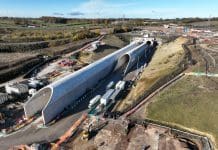Greengauge 21, a leading transport think tank has advised that high-speed rail connecting all of UK mainland by 2050, will put ‘rocket fuel in Britain’s economy’ by improving productivity for thousands of commuters
Greengauge 21 suggested that in doing so, it would put the UK on a level playing field with countries such as Germany, Italy and France who hugely benefit from their transport systems.
By improving rail speeds and reducing journey times, the pressure would be taken away from London, allowing other cities to prosper, it added.
The group proposed that by adding a new connection in the West Midlands, HS2 trains could travel to and from cities such as Bristol, Cardiff, Newcastle and Edinburgh with ease.
Further proposals from the group include:
1. An upgraded fast route from Birmingham to Bristol Parkway carrying HS2 trains, continuing to the South West and South Wales.
2. A major upgrade to the East Coast mainline for the first time since the 1980s.
3. New high speed lines in Scotland, achieving a three-hour 15-minute journey time between Edinburgh and London.
4. New lines in East Essex and Anglia, alleviating the West Anglia and Great Eastern Mainlines, both of which are at capacity.
5. Bringing Liverpool, Manchester, Leeds, Bradford, Sheffield, Newcastle and Hull together with new connections to form “an effective and powerful economic unit”.
HS2 is the UK’s high-speed rail network, that will carry thousands of commuters on trains travelling up to 250mph from London to Birmingham and Manchester to Leeds.
HS2 promises to half the travel time from Birmingham to Manchester and Leeds, making collaboration between cities in the north a lot easier.
Commenting on the news, Adam Perry, director at Resonate, a provider of connected transport solutions said:
“Building a faster, more efficient rail network is critical not only for improving Britain’s transport links but for driving economic growth.
“Whilst speed of service is crucial, we also need to see a data-driven approach to managing the capacity and punctuality of train services across the country.
“This means offering rail users better connected journeys, capturing and analysing data to spot overcrowding, identifying congestion on the network and taking action to prevent problems before they happen.
We’ve already seen huge progress in smart transport solutions in the automotive sector, so it’s time for the rail industry to reach its full potential by putting technology at the heart of service delivery.”














